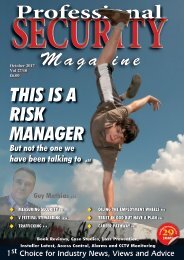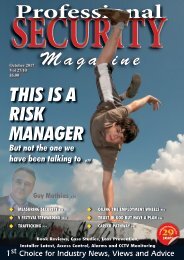27-11draft
Create successful ePaper yourself
Turn your PDF publications into a flip-book with our unique Google optimized e-Paper software.
Business Crime<br />
Dan Hardy; also a<br />
former Corporate Crime<br />
and Security Lead at<br />
Sainsbury’s<br />
Photo courtesy of National<br />
Business Crime Solution<br />
Retailers aim for<br />
consistency in what they<br />
provide to customers; so<br />
why not in response to<br />
crime? Right: Burberry in<br />
Bond Street. London’s<br />
West End suffers from<br />
smash and grab thefts of<br />
high-value goods<br />
Photos by Mark Rowe<br />
Mayoral meet<br />
Most motorcycle crime is<br />
carried out on stolen<br />
vehicles, so making them<br />
harder to steal in the first<br />
place is essential, a recent<br />
meeting chaired by London<br />
Deputy Mayor for Policing<br />
and Crime Sophie Linden<br />
heard.<br />
18<br />
coaching for correct response:<br />
ASDA AIMS FOR<br />
CONSISTENCY<br />
A retailer is working with police<br />
towards getting consistency in<br />
response to crime, the Retail Risk<br />
conference heard from Dan Hardy,<br />
the new MD of National Business<br />
Crime Solution (NBCS) who spoke in<br />
place of Insp Sarah Cook of Thames<br />
Valley Police. That force has worked<br />
on Operation Retail with Asda;<br />
similar trials have run in Somerset<br />
and Cleveland. Dan Hardy, himself a<br />
former Met Police man, began with<br />
consistency: does a retailer train<br />
staff consistently in how to deal with<br />
confrontation? “I think the answer<br />
is no.” Likewise, does a retailer get<br />
consistent response from police when<br />
ringing? Again, response may be<br />
poor; or none at all. Have staff told<br />
police call handlers the right things?<br />
Hence the operation, to coach staff to<br />
report a crime correctly. If a security<br />
officer detains a suspect thief, the<br />
police control room will ‘triage’. The<br />
caveat, as Hardy said, is that police<br />
may not have the resources to attend,<br />
whatever the details. Police will ask<br />
about threat; harm; and risk.<br />
Thief or victim?<br />
If a store has detained a 13-yearold<br />
Rumanian shoplifter; or, is he a<br />
possible victim of human trafficking?<br />
The Thames Valley trial found an<br />
87 per cent rise in reported business<br />
crime; and a 17pc reduction in police<br />
attending. That is, coaching and<br />
awareness can give the retailer the<br />
correct help. Hardy went through<br />
what for police are ‘aggravating<br />
factors’; a weapon such as a knife;<br />
a ‘hate crime’; threat to staff or<br />
public; an under-18 offender; a<br />
repeat offender or known vulnerable<br />
premises (such as a repeat victim<br />
of crime; and if reports don’t get<br />
through, police don’t know that, as<br />
Hardy pointed out). Everyone, as<br />
he acknowledged, can give a story<br />
of dialling for police help and not<br />
getting a reply for three hours. The op<br />
offers at least the benefit that the shop<br />
would know police are not coming,<br />
and could move the offender on,<br />
saving the retailer time. Sainsbury’s<br />
besides Asda are looking to roll this<br />
out further. p<br />
NOVEMBER 2017 PROFESSIONAL SECURITY<br />
Centre<br />
launch<br />
Last month saw the launch of the<br />
National Business Crime Centre.<br />
Metropolitan Police Det Chief Insp<br />
Georgie Barnard, pictured, described<br />
it to the Retail<br />
Risk conference<br />
in Leicester<br />
beforehand.<br />
Among the aims;<br />
to ‘deliver a<br />
better policing<br />
response’ to<br />
organised crime,<br />
working with the<br />
City of London<br />
Police (on fraud) and the National<br />
Crime Agency, on organised crime<br />
against businesses that police might<br />
not be picking up. She said: “I<br />
understand the frustration with Action<br />
Fraud [the official national reporting<br />
line]. I absolutely get that the system<br />
isn’t working as it should be.”<br />
Bond Street<br />
The centre is looking at specialist<br />
crimes, such as ‘moped-enabled’<br />
robberies on high-end stores in Bond<br />
Street in London’s West End. Besides<br />
working with the Met’s Flying Squad<br />
on policing response to those smashand-grabs,<br />
the centre is working<br />
with local government on trying to<br />
design out crime in that area, such<br />
as with street furniture. The centre<br />
wants to share alerts and updates on<br />
incidents; and Georgie urged security<br />
people if working on a project worth<br />
doing in other places to share too;<br />
‘the more input we have, everybody<br />
benefits’. Work with the National<br />
College of Policing and universities<br />
is looking at ‘what works’, another<br />
sign of a more business-like police.<br />
As Georgie said: “Your bosses don’t<br />
want to invest in things that haven’t<br />
been evaluated, and my bosses<br />
don’t.” Speaking to a retail loss<br />
prevention and related audience, she<br />
urged security teams to reach out to<br />
local police, and encouraged local<br />
briefings, saying there was nothing<br />
more frustrating than having police<br />
on a high street and security teams on<br />
the same street, working in different<br />
ways and not properly briefed. She<br />
praised Sainsbury’s in Sussex, where<br />
the chain’s security contractor Mitie<br />
besides working in supermarkets will<br />
walk through high streets wearing<br />
tabards, ‘and this is proving really<br />
successful’. They become more<br />
familiar with other security teams<br />
in the area, ‘and they really do<br />
collaborate and share intelligence and<br />
information and guess what, it drives<br />
down crime in that area, people feel it<br />
is a nicer, safer environment to go in<br />
and shop, and we need to see more of<br />
that kind of collaboration.’<br />
Lack of trust<br />
She acknowledged that one of the<br />
biggest challenges is lack of trust<br />
by police in private security; also<br />
a theme of the Security Institute<br />
annual conference, two days earlier.<br />
DCI Barnard’s centre besides<br />
working on counter-terrorism does<br />
work on the police-industry crosssector<br />
email alerts, CSSC, as she<br />
recalled set up for the Olympics in<br />
case of anticipated problems, and<br />
proven successful. It’s free to sign<br />
up to and is rolling out nationally.<br />
She described herself as a ‘big fan’<br />
of local business crime reduction<br />
partnerships, who know the ‘local<br />
scalliwags’. Here again she admitted<br />
that retailers may struggle to see the<br />
value in paying for so many, and said<br />
that the centre will be setting out what<br />
a local partnership should look like,<br />
seeking to raise standards. On<br />
violence reduction (‘number one<br />
priority for all of us’) she thanked<br />
Iona Blake of Boots and others<br />
for setting up with the Home<br />
Office a working group, looking at<br />
technical (body worn cameras) and<br />
training (in conflict management),<br />
besides working with the Ministry<br />
of Justice, aiming to reduce<br />
violence against shop staff. p<br />
www.professionalsecurity.co.uk<br />
p18 retailrisk <strong>27</strong>-11.indd 1 10/10/2017 16:17










